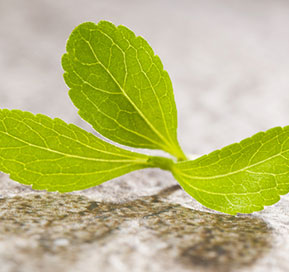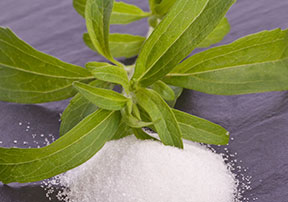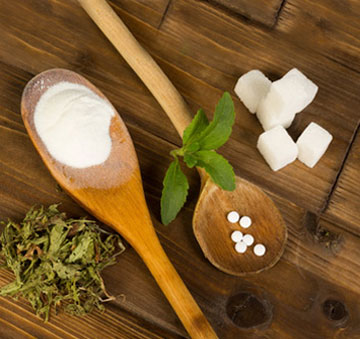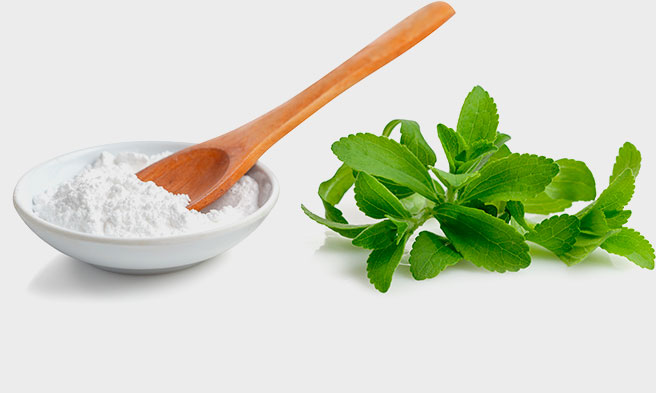Stevia products
VIEW STEVIA PRODUCTSWhat is Stevia?
The last few years, Stevia has become the most highly debated sweetener and, ultimately, the dominant substitute of sweetness in drinks, sweets and food worldwide. It constitutes the main competitor of sugar and artificial sweeteners.
Stevia', is a natural sweetener that has been extracted from the plant Stevia (Stevia rebaudiana), which is a type of bush coming from South America and more specifically Paraguay. The sweet taste of its leaves, has been known for centuries in these countries where it is used as a natural sweetener.
Stevia leaves contain various natural sweeteners, such as steviol glycosides, of which stevioside and rebaudioside-a are the sweetest. They also contain other useful substances, such as minerals and trace elements such as potassium, magnesium, chromium, selenium, zinc, manganese, B vitamins (especially niacin) and plant nutrients like natural green chlorophyll, and plant sterols.



What makes it superior.
Stevia leaves contain sweeteners, which are much sweeter than sugar (300 times), making it a powerful sweetener which gives no energy (zero calories) and carbohydrates and therefore a zero glycemic index and zero glycemic load, in contrast to sugar which gives us 4 kcal / g and carbohydrates
These attributes make stevia the most suitable substitute for sugar and other sweeteners because it can contribute to:
- Improved control of our weight - reducing or maintaining body weight. Reduces the caloric content and maintain a pleasant sweet taste in the diet, while helping us to stay faithful to the diet schedule for a longer period of time
- Improved control of glucose levels in the blood - has negligible effect on blood glucose levels so it can be used by diabetics versus sugar or other sweeteners
- Recent studies confirm that daily use does not cause any effect on levels of fasting glucose, insulin, glycosylated hemoglobin, and blood lipids.
- Teeth protection - do not cause tooth decay

How safe is the use of Stevia
The long-term use of stevia over centuries, by the natives of N. America proves its safety. Additionally, studies and relevant health institutions around the world, such as the European Authority for Food Safety (EFSA) and the US Food and Drug Administration (FDA), consider the safe consumption by all population groups.
Japanese people adopted its use, from early 70s, as opposed to Europe which followed many years later and finally approved its use in food and beverages in November 2011.
Use of stevia in confectionery
As mentioned above extracts of stevia are used as substitutes for the granulated sugar, and other natural or artificial sweeteners in drinks, light refreshments, sweets and liqueurs. Stevia is the only sweetener that can withstand or resist very high temperatures up to 200 degrees Celsius where other artificial substances decay at those temperatures, therefore its use is popular in confectionery.
However, special attention should be paid to the consumption of sweets containing stevia as a sweetener because, although it may have a lower calorific value than sweets that contain granulated sugar, it may contain ingredients such as cream, flour, butter or other ingredients affecting blood glucose and blood lipid which, in consumption terms, are restrictive factors for diabetic or obese people. People who have to follow a special diet should ask their doctor or dietitian before they decide to consume them.
Stalo Mestana
Dietician Nutritionist ( BSc,MSc,SRD)
44-46 Karneadou Str
Kolonaki
stalomestana@gmail.com
Tel. 210-7013485,6944-520086
Financial reports
By clicking OK you agree to the storing of cookies on your device to enhance site navigation, analyze site usage, and assist in our marketing efforts.
OK
